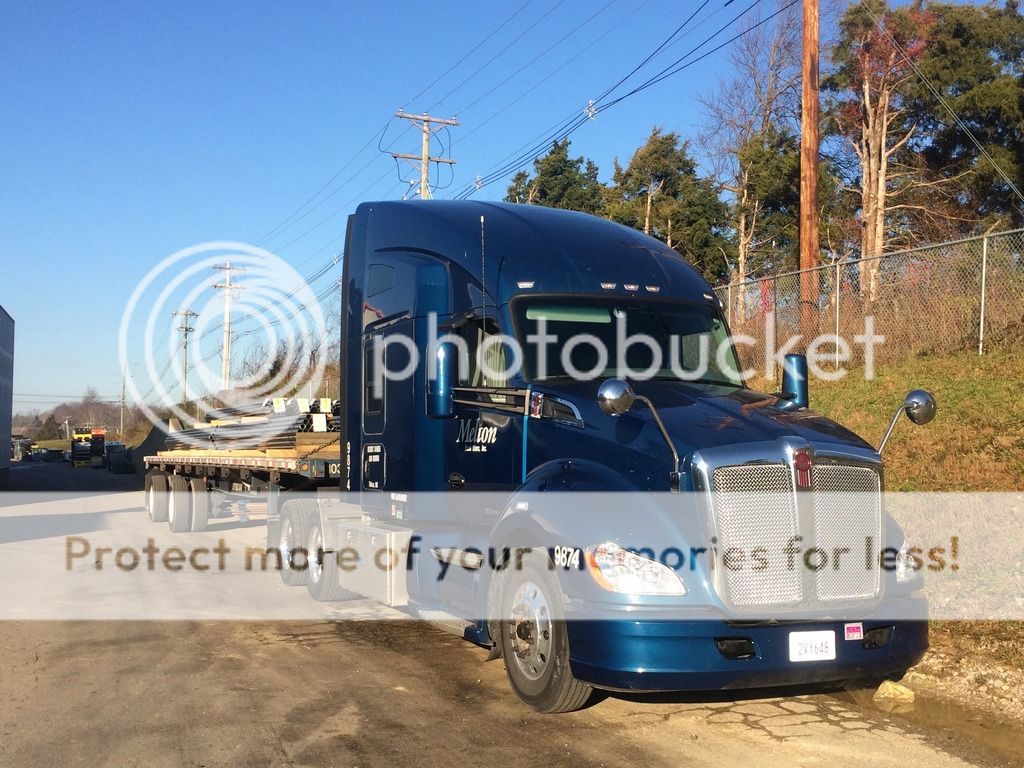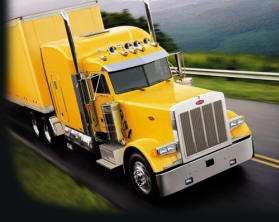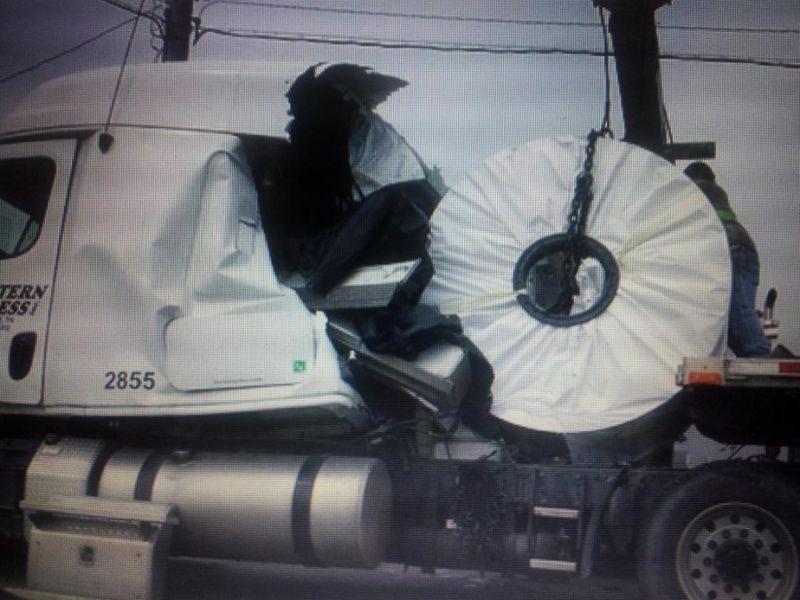First Day Flatbeding
Topic 11789 | Page 1
Have you spent any time with a flatbedder to learn how to secure loads? Or at least gone through some classroom training on it? It's not hard once you learn the rules and actually do it, but you really need some kind of education. There are a couple of good items in the wiki here that will help. You can also ask another driver at shippers how they would secure it. Most will help you.
Shipper:
The customer who is shipping the freight. This is where the driver will pick up a load and then deliver it to the receiver or consignee.

I've only been flatbedding for a a month, a week solo. One thin ice learned is that you cannot over secure a load. It's better to have 5 to many straps than 1 to few. Remember when you secure your load you are trying to stop 5 possible movements. Up/down, front/back, left/right and toppling. There are several good videos on YouTube you can check out. I believe all our company training videos can be accessed on YouTube. Just look up Melton Safety videos or something like that.
I hat to say this, but be careful listening to other flatbedders. Some really know their stuff and can teach you a ton. Others have no clue. When I was training we ran across a guy. His company leased him a truck and turned him loose on a flatbed with no training. Guy had no idea what he was doing. Good thing was that he knew it and was open to any help he could get. But I've seen guys from our own comany(mostly young guys) tell my trainer to shove off when he tried to help them.
Good luck and be safe.
OOS:
When a violation by either a driver or company is confirmed, an out-of-service order removes either the driver or the vehicle from the roadway until the violation is corrected.

Yes, over secure always!
Also, wherever you load, ask the workers there how other people usually secure the loads. Or watch some of the other drivers.
It will take a few months of securing different types of loads to start getting a feel for the best techniques.

I am surprised that Old School hasn't chimed in on this topic yet. Not only is he a moderator on this forum, he also pulls a flatbed (I think), with many years of service and wisdom.

Hopefully he will have time to soon. Gonna be interesting to hear from him!

Thanks for the feed back. I really do appreciate all of your words of encouragement. Though I know and will be open to a life long experience of learning, I feel that CRST Malone has given me a strong start with their training course. But please, I welcome any and all words of advice and knowledge about flatbedding. I hope I never get to the point of thinking that I know too much to be listening to someone about flatbedding. Hauling coils, pipes, beams, and sheet metal is really serious stuff. Thanks again
After two days of hands on training I think I picked the wrong profession, Lol. I'm aching all over!

The soreness gets better after a while. In just a few weeks I've gotten where it doesn't bother me. Although that load earlier this week with three tarps was just a little rough. Mainly cause the wind just wouldn't quit.
My biggest issue is getting out of breath working at these higher elevations I've been in.

My biggest issue is getting out of breath working at these higher elevations I've been in.
I totally know what you mean! A few weeks ago I had to chain up on that pass west of Denver on I-70... 11,000+ feet and dragging those heavy @$$ chains around, slinging them up on the tires, crouching and crawling through the muck... By the end I felt like I was having an asthma attack, and I've never had asthma!
HOS:
Hours Of Service
HOS refers to the logbook hours of service regulations.Ezequiel, welcome to our forum!
Hey definitely feel free to ask other flat-bedders at places you are loading about the best way to secure something if you are uncertain. If you still are uncomfortable with the advice ask another driver or observe what others are doing. Most flat-bedders will be very helpful. Occasionally you are going to come across someone who is too selfish, but for the most part you will find other flat-bedders to be among the most helpful drivers around.
I would highly recommend that you spend some time in our High Road Training Program, it is absolutely free and there is a very thorough section in it on load securement. Brett did a great job putting it together and it will only benefit you in this new endeavor.
You are a brave man taking on a new truck leasing situation, basically starting a business of your own, and starting it as a flat-bed driver with little or no experience in load securement. Feel free to jump in here any time with questions about managing your trucking business, or load securement. We will do what we can to assist you. You may enjoy perusing through this thread on Flat-bed Variety. You may find some tips and tricks in there. Flat-bed securement can be broken down to simple math. Each of your securement devices, your straps, chains, and binders has a working load limit assigned to them. As long as you have sufficient securement devices attached properly to points on the trailer that also have working load limits assigned to them you can make sure it is safe. That is the simplified form of saying it, but it can easily be learned by applying yourself to the study of it. That section in the High Road that I referenced will get you off to a really good start.
Coils are serious pieces of freight that need to be secured properly! We sure don't want to see your Malone truck on the side of the road going through an experience like this driver had to.

CDL:
Commercial Driver's License (CDL)
A CDL is required to drive any of the following vehicles:
- Any combination of vehicles with a gross combined weight rating (GCWR) of 26,001 or more pounds, providing the gross vehicle weight rating (GVWR) of the vehicle being towed is in excess of 10,000 pounds.
- Any single vehicle with a GVWR of 26,001 or more pounds, or any such vehicle towing another not in excess of 10,000 pounds.
- Any vehicle, regardless of size, designed to transport 16 or more persons, including the driver.
- Any vehicle required by federal regulations to be placarded while transporting hazardous materials.
New Reply:
New! Check out our help videos for a better understanding of our forum features

















Preview:








 TT On Facebook
TT On Facebook
Just completing my orientation at CRST Malone and getting ready to assume my first flatbed. I started dry van hauling in January 2015, after six years of 26' straight truck driving in NYC. Now 11 months later of switching to 53' dry vans, I'm switching to flatbed. It all seems overwhelming. So much new info to be worried about. Strapping, chaining, load-board, broker, qualcomm. All new to me. I'm really worried about me getting this right the first time. These 40000 lb coils and these 100 lb pipes need just slip a little and there will be nothing to stop it from moving. Any advise about flat-bedding will be highly appreciated.
Qualcomm:
Omnitracs (a.k.a. Qualcomm) is a satellite-based messaging system with built-in GPS capabilities built by Qualcomm. It has a small computer screen and keyboard and is tied into the truck’s computer. It allows trucking companies to track where the driver is at, monitor the truck, and send and receive messages with the driver – similar to email.Dry Van:
A trailer or truck that that requires no special attention, such as refrigeration, that hauls regular palletted, boxed, or floor-loaded freight. The most common type of trailer in trucking.